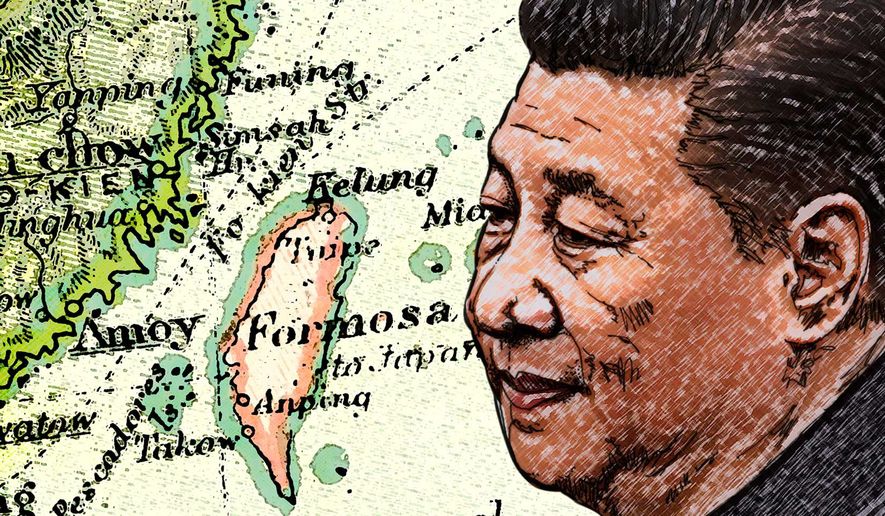OPINION:
This week, the world will witness the first meeting between U.S. President Donald Trump and Chinese President Xi Jinping. There has been much speculation on which topics their conversations will address, and it is a safe bet that Taiwan will be on the list. The U.S.-Taiwan relationship is a vital one, and it is necessary — especially in this time of change and uncertainty — to restate the reasons why.
Thirty-eight years ago this month, the Taiwan Relations Act (TRA), an important, bipartisan creation of the U.S. Congress, was signed into law. Necessitated by Washington switching its official diplomatic recognition from Taipei to Beijing, the TRA has allowed the United States to maintain its friendship and ties of cooperation with Taiwan and its people. It states that the status of Taiwan should be determined by peaceful means, and that nonpeaceful means to do so are a threat to the region and of grave concern to the United States.
At the same time, the TRA recognized, and continues to recognize, the reality of the world in which we live — one where Beijing has never renounced the use of force to take Taiwan, and where it engaged first in a massive military build-up across the Taiwan Strait, and now in the waters of the East and South China Seas. The TRA mandates that the United States “make available to Taiwan such defense articles and defense services in such quantity as may be necessary to enable Taiwan to maintain a sufficient self-defense capability,” and we have done so in the decades since with bipartisan support.
Relations between the United States and Taiwan were further bolstered through the Six Assurances made to Taiwan by President Ronald Reagan in 1982, which stipulated: the TRA would not be altered, the United States would not mediate between Taipei and Beijing, and the United States would not alter its position about Taiwan’s sovereignty or formally recognize China’s sovereignty over Taiwan.
As a result of U.S. commitments to Taiwan, an environment was created where the people of Taiwan — the population of which is now more than 23 million — built a true, functioning democracy that has experienced the peaceful transfer of power from one political party to another three times since 2000 at the presidential level, and for the first time at the legislative level last year. Americans who have visited Taiwan or worked with Taiwanese people know that the reason the relationship is so strong is because we share many of the same values — a commitment to democracy, personal freedom, individual expression and the rule of law. Taiwan has concurrently grown into a vibrant society garnering achievements in science and technology, education, the arts and popular culture that have been exported and embraced by people elsewhere in the region and around the world.
In every sense, the TRA and the relationship that has been built upon it have been successful. Just as Taiwan has benefited, so has the United States and the wider global community. Taiwan today is not only one of America’s most dependable allies in the Asia-Pacific and its 10th-largest trading partner, but it is an example for emerging democracies everywhere and a leader in providing humanitarian aid in times of need — all this in spite of the regrettably limited international space in which Taiwan is allowed to operate.
At a time when democracy appears to be in retreat in many parts of the world, Taiwan demonstrates how it can be a success. As American diplomats and foreign policy experts have pointed out time and again, the U.S. commitment to Taiwan underscores to America’s friends and foes its commitments to its allies and to democracy, and helps to maintain U.S. credibility abroad.
In the five months since the U.S. presidential election, there has been needless uncertainty regarding U.S. policy on China, Taiwan and cross-strait relations. Before his confirmation earlier this year, Secretary of State Rex Tillerson reaffirmed the TRA and the Six Assurances and said, “The U.S. commitment to Taiwan is both a legal commitment and a moral imperative.” This was a positive first step.
This week’s Trump-Xi meetings are an opportunity for the president to both publicly and privately make the same important points. U.S. engagement with China is important to the peace and stability of the Asia-Pacific region, but it is also vital that the mutual interests of the United States and Taiwan should not in any way be compromised by this process.
• Lester Wolff is a former chairman of the Asian and Pacific Affairs subcommittee of the House Foreign Affairs Committee and was a principal author of the Taiwan Relations Act. He is currently a policy adviser to TECRO.




Please read our comment policy before commenting.